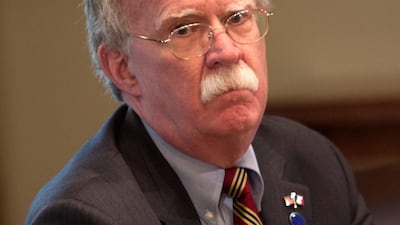The United States is looking to a “Libya model” in pursuing nuclear disarmament talks with North Korea, National Security Advisor John Bolton said in comments which have baffled experts.
A recent thaw in relations with North Korea has the US hoping to make progress in efforts to dismantle North Korea's nuclear programme, with which President Kim Jong-un has periodically threatened his rivals.
Mr Kim’s nuclear arsenal has served to protect him from the threat of regime change, so when President Donald Trump's National Security Advisor suggested that the US consider the North African country as a model for denuclearisation talks, observers were confused. After all, while Libya gave up its nuclear programme in 2004, former strongman Muammar Gaddafi was subsequently killed in 2011 and the country has been in turmoil since. Hardly a model to incentivise President Kim, they suggested.
In an interview with CBS on Sunday, Mr Bolton said the onus would be on North Korea to show it is serious about giving up their nuclear weapons. “I think we're looking at the Libya model of 2003, 2004,” he said. “One thing that Libya did that led us to overcome our skepticism was that they allowed American and British observers into all their nuclear related sites. So it wasn't a question of relying on international mechanisms.”
Previously Mr Bolton has advocated for regime change in north Korea, and more recently called for the scrapping of the Iran nuclear deal. But back in 2003, Mr Bolton was serving as President George W Bush's Under Secretary of State for Arms Control and International Security when the British intercepted a shipment of centrifuge parts bound for Libya.
It was shortly after the US invasion of Iraq, and as the British and Americans pushed Gaddafi to halt his nuclear programme, the thought that he could be the next dictator to be toppled would have been foremost in the colonel's mind.
_______________
Read more:
North Korea vows to shut down nuclear site in effort to denuclearise peninsula
Trump says North Korea has made major nuclear concessions
Editorial: Cautious optimism is required on North Korean thaw
______________
In secret, Mr Gaddafi gave full access to inspectors from the British and American governments and publicly to inspectors from the International Atomic Energy Agency (IAEA).
One of the IAEA inspectors sent to Libya in 2004 was Robert Kelley, a former nuclear weapons analyst from the US Los Alamos National Laboratory. Today he's shaking his head at the idea that there is a Libya model for nuclear disarmament. "It's enigmatic," Mr Kelley told The National. "I'm having trouble figuring out what Bolton's model is in his head."
For one thing, Mr Kelley recalls Mr Bolton being opposed to IAEA inspectors being sent to Libya. “We were called to the US mission and told to do the inspection,” he recalls. “Bolton was in the room and he was furious. He didn’t want people from the IAEA to go in and do the inspection.”
Mr Bolton, a hawkish hardliner, believed that only US officials should be involved – not UN agencies. He had earlier characterised Libya as a "rogue state" beyond President Bush's infamous "Axis of Evil" – which included North Korea. He also opposed Mr Bush's disarmament deal with Gaddafi, so much so that he was eventually side-lined from the agreement.
Mr Kelley went on to inspect sites across Libya and found little evidence that Gaddafi had ever seriously attempted to obtain nuclear weapons.
This, says Mr Kelley, leads him to question the relevance of any "Libya model" in the context of North Korea, which has a mature nuclear weapons programme and has successfully tested at least six devices.
_______________
Read more:
Comment: Kim Jong-un has no incentive to denuclearise. The sooner Trump realises that, the better
Donald Trump welcomes 'historic' Korea summit
Comment: One president, two threats and three flawed deals: how Trump's nuclear victories will be hollow ones
_______________
“Libya had done virtually nothing in the field of nuclear weapons themselves,” he said. “If they hadn’t acquired some drawings from Pakistan of a nuclear device, which they left sitting in a safe that they admitted they hadn’t even looked at very closely, there would have been nothing to discover.”
Disarming North Korea will be an entirely different undertaking, he believes. The country has developed facilities ranging from enrichment facilities to weapons sites, the locations of some are closely guarded secrets which President Kim will not give up without major concessions. “It’s the basis of their survival at this point and how they’ve managed to get the US to the table.”
When Mr Bolton talks of Libya and its applicability to North Korea denuclearisation, he is likely thinking of the complete access inspectors were given, says Alberto Muti, a nuclear non-proliferation and verification research organisation VERTIC. "When they went into Libya, they were given very large freedom to move around and look for other possibly undeclared facilities," he told The National. "They would want that for North Korea."
This kind of access has been a major stumbling block in the past, including during six party talks which ended fruitlessly in 2009. “Personally I believe it would be very difficult and a big concession, above and beyond any concession North Korea has made in the past,” Mr Muti said.
Another comparison Mr Bolton may be thinking of is nuclear disarmament as a prelude to sanctions relief and as an alternative to regime change. “But if this is the deal we want to strike, the historical record with Libya is just not good enough,” Mr Moti pointed out.
While most sanctions against Libya were lifted in 2004, he was eventually overthrown in 2011 in an uprising which was supported by a NATO bombing campaign. “Even if it might be tempting to say there wasn’t a direct link… well it was the same parties. If I were north Korea, I wouldn’t find that very pacifying.”

